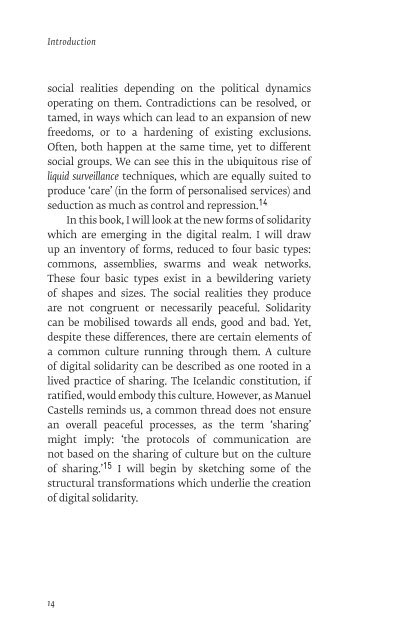KTub8
KTub8
KTub8
You also want an ePaper? Increase the reach of your titles
YUMPU automatically turns print PDFs into web optimized ePapers that Google loves.
Introduction<br />
social realities depending on the political dynamics<br />
operating on them. Contradictions can be resolved, or<br />
tamed, in ways which can lead to an expansion of new<br />
freedoms, or to a hardening of existing exclusions.<br />
Often, both happen at the same time, yet to different<br />
social groups. We can see this in the ubiquitous rise of<br />
liquid surveillance techniques, which are equally suited to<br />
produce ‘care’ (in the form of personalised services) and<br />
seduction as much as control and repression. 14<br />
In this book, I will look at the new forms of solidarity<br />
which are emerging in the digital realm. I will draw<br />
up an inventory of forms, reduced to four basic types:<br />
commons, assemblies, swarms and weak networks.<br />
These four basic types exist in a bewildering variety<br />
of shapes and sizes. The social realities they produce<br />
are not congruent or necessarily peaceful. Solidarity<br />
can be mobilised towards all ends, good and bad. Yet,<br />
despite these differences, there are certain elements of<br />
a common culture running through them. A culture<br />
of digital solidarity can be described as one rooted in a<br />
lived practice of sharing. The Icelandic constitution, if<br />
ratified, would embody this culture. However, as Manuel<br />
Castells reminds us, a common thread does not ensure<br />
an overall peaceful processes, as the term ‘sharing’<br />
might imply: ‘the protocols of communication are<br />
not based on the sharing of culture but on the culture<br />
of sharing.’ 15 I will begin by sketching some of the<br />
structural transformations which underlie the creation<br />
of digital solidarity.<br />
14


